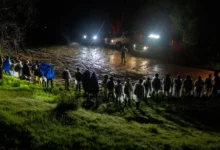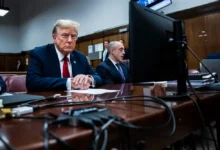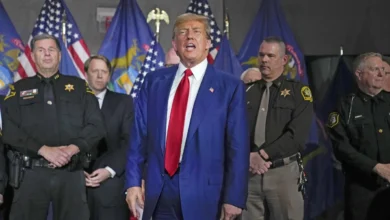How Trump responded to ‘Access Hollywood’ tape,Prosecutors are getting closer to the crime.

Jurors saw a full transcript of the “Access Hollywood” tape on Friday, including Trump’s infamous “grab ‘em by the p*ssy” comment, as well as other vulgar language the campaign tried to dismiss as “locker room talk.”
(They did not, however, hear Trump on the tape, as the judge ruled the video would be prejudicial to the jury.)
Hicks took the jury inside the chaos within Trump’s campaign scrambling in response to the Washington Post story on October 7, 2016. Hicks first learned about the tape when the reporter emailed her for comment for his story that day.
“I was concerned,” Hicks testified about her thinking. “I was concerned about the contents of the email. I was concerned about the lack of time to respond. I was concerned we had a transcript without a tape. There was a lot at play.”
Hicks forwarded the email that included a transcript of the audio to several Trump campaign staffers including Kellyanne Conway.
“FLAGGING,” Hicks wrote in the email, with two notes: “1) Need to hear the tape, to be sure. 2) Deny, deny, deny.”
“Strategy number two was going to be a little more difficult,” Hicks said, chuckling on the stand.
Hicks recalled telling Trump about the tape with several other senior staffers like Steve Bannon, Conway, Jared Kushner and Jason Miller at Trump Tower when the story first broke.
“He said that didn’t sound like something he would say,” Hicks testified, noting Trump asked to see the actual tape. Once Trump saw the tape, however, he was upset.
Hicks said that “in that moment” she was not concerned about the impact this would have on female voters, but said it crossed her mind maybe a few hours later or the next day.
“He didn’t want to offend anybody,” Hicks said of Trump. “I think he felt like it was pretty standard stuff for two guys chatting with each other.”
Prosecutors are getting closer to the crime
For two weeks, prosecutors have delved deeply into the negotiations that led to hush money payments made to McDougal and Daniels before the 2016 election.
But those payments are not illegal on their own. Trump is charged with 34 counts of falsifying business records stemming from how he allegedly hid the way Cohen was reimbursed for paying $130,000 to Daniels in order to keep her quiet before the 2016 election.
With Hicks’ testimony, prosecutors nudged closer to the repayment and the alleged charges.
Hicks was asked about the response inside the White House when stories about Cohen’s payment to Daniels emerged in 2018 – and Cohen initially claimed he had made the payment without Trump’s knowledge.
Hicks testified that Trump told her about the hush money payment after Cohen gave a statement to The New York Times, saying that Cohen paid the money to Daniels of his own volition.
Colangelo sarcastically asked Hicks if it seemed like Cohen’s character to just pay Daniels for Trump “out of the kindness of his heart.”
“I’d say that would be out of character for Michael,” Hicks responded. “I didn’t know Michael to be an especially charitable person or selfless person.”
Hicks also said that Trump told her it was better for the story to come out at that point, in 2018, rather than before the 2020 election. “It was Mr. Trump’s opinion that it was better to be dealing with it now and that it would have been bad to have that story come out before the election,” she said.
Hicks said she did not have direct knowledge of the payments or repayments for the hush money. But she set the scene for future witnesses to come who will begin to detail that part of the story to jurors.
Hicks describes the tape ‘crisis’ and denying Daniels’ allegations
After sitting in the witness box, Hicks looked visibly uncomfortable and quickly acknowledged as much when she began answering questions.
“I’m really nervous,” she said, adjusting herself and the microphone in front of her.
Trump often had a scowl on his face, occasionally looking at Hicks and frequently passing notes with his attorneys while watching the proceedings play out on the television above him. Hicks, for her part, looked nearly always at assistant district attorney Matthew Colangelo and the jury, not at the defendant’s table.
Much of Hicks’ testimony focused on her role on the Trump campaign in October 2016, just before Election Day. Prosecutors asked what happened when the “Access Hollywood” tape came out.
“The tape was damaging. This was a crisis,” Hicks said.
The aftermath of the tape then informed how the campaign responded when the Wall Street Journal reported on Karen McDougal’s deal with American Media, Inc. not to speak about an alleged affair as part of a $150,000 agreement
In the report, which also mentioned Daniels, Hicks, then a Trump campaign spokesperson, denied that Trump had had affairs with either woman.
“What I told to the Wall Street Journal is what was told to me,” Hicks said of the denial she gave about the Daniels allegations.
When cross-examining Hicks, Trump attorney Emil Bove elicited testimony that Trump was also concerned about what his wife would think. Trump asked for the newspapers not to be delivered to his residence the day the story published, Hicks testified.
“I don’t think he wanted anyone in his family to be hurt or embarrassed by anything that was happening on the campaign trial.


